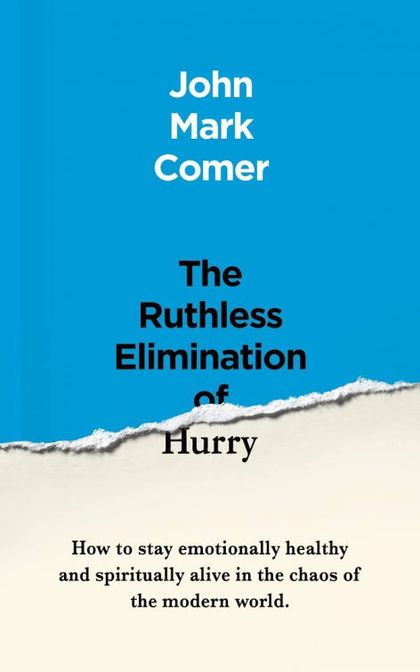Eliminating hurry in a restless society
A review of John Mark Comer’s latest book The Ruthless Elimination of Hurry.
01 JANUARY 2020 · 16:00 CET

Imagine this scene: you meet a friend walking down the road, so you stop for a chat. Since you haven’t seen your friend for a few days, you ask that standard opening question: “How’s your week been?”
And you get the standard reply: “Oh, great, just really busy”.
I’ve had that conversation, probably hundreds of times, on both sides. So I know it’s not just me. My guess is that most people recognise it.
In this ordinary conversation, hiding in plain sight, is what Dallas Willard called ‘the great enemy of spiritual life in our day’: hurry.
Willard’s words give pastor and author John Mark Comer the title of his new book, The Ruthless Elimination of Hurry.
Comer draws on his own personal experience of the dangers of a life of hurry, distraction and anxiety, and then considers the cultural and technological trends which have created what one author has called ‘the age of acceleration’.
We increasingly live at a frenetic pace, rushing and hurrying through life, constantly distracted by our omnipresent digital devices. And the danger, as Comer argues, is that because this has become our ‘new normal’, we fail to realise that ‘hurry is a threat not only to our emotional health but to our spiritual lives as well.’ (p.52)
Comer reminds us that the invitation of Jesus in Matthew 11 is particularly important for our time:
‘Come to me, all you who are weary and burdened, and I will give you rest. Take my yoke upon you and learn from me, for I am gentle and humble in heart, and you will find rest for your souls. For my yoke is easy and my burden is light.’ (Matthew 11:28-30)
Here is Eugene Peterson’s version in The Message:
‘Are you tired? Worn out? Burned out on religion? Come to me. Get away with me and you’ll recover your life. I’ll show you how to take a real rest. Walk with me and work with me—watch how I do it. Learn the unforced rhythms of grace. I won’t lay anything heavy or ill-fitting on you. Keep company with me and you’ll learn to live freely and lightly.’
With brilliant insight, Comer shows how this is a radical, countercultural invitation – to an unhurried life filled with love, joy and peace. Jesus’ life was exactly that: although his life was full, he didn’t rush.
He had time to talk to people, to sleep, to eat meals, to accept interruptions. ‘If there’s anything you pick up from reading the four Gospels, it’s that Jesus was rarely in a hurry.’ (p.89)
To follow Jesus’ example, and to ruthlessly eliminate hurry, Comer offers four spiritual disciplines: silence and solitude; Sabbath; simplicity; and slowing.
These chapters are filled with practical suggestions for how to ‘unhurry’ your life, from stopping to spend time alone with God, to everyday things like setting limits on the use of your TV or phone.
There are many excellent and challenging ideas here, but as Comer emphasises throughout they are a means to an end: in step with the Holy Spirit, these practices enable the experience of ‘life to the full with Jesus’. (p.107)
As you can probably tell by now, I really enjoyed this book. It’s written with an easy grace and informality that is brilliantly combined with good research and profound theological and spiritual implications.
The fact that the whole book is rooted in Comer’s personal experience lends it real authenticity. This is a compelling vision of an unhurried life fully committed to discipleship with Jesus.
But it also has implications for how we think about public life, and how the church can collectively speak to this cultural moment of hurry.
When asked, Jesus defined love as the highest priority of the Kingdom of God, and love is a quality of relationships: thus relationships should sit at the centre of how we think about public life.
On this Comer is clear about the dangers of hurry: ‘hurry and love are incompatible’ (p.23); even more strongly, ‘hurry kills relationships’ (p.52).
Let’s look at an example: the Sabbath, one day per week set apart for rest and worship, so that we can delight in God, each other and creation. It is a key practice for the people of God throughout the Bible.

One of the Jubilee Centre’s first campaigns was to ‘keep Sunday special’, aiming to prevent deregulation of Sunday trading. One of the reasons behind this campaign is the relational value of a shared day set apart for rest and worship, a Sabbath.
In 2019, outside religious communities, increasingly there is little distinction between Sunday and the other six days of the week. Some people have no choice but to work on Sunday, whether due to financial circumstances or a zero-hours contract.
Most Christians still have a day off from their regular job, and go to a church service. But – and until last year this was my life too, so no guilt here – the rest of the day rarely looks like rest and worship.
It looks like all the other days – full of to-do lists and shopping and entertainment and distraction and hurry. Comer is one of several recent authors who highlight the loss of the concept and practice of Sabbath in our culture. A. J. Swoboda has commented:
‘[The Sabbath] has largely been forgotten by the church, which has uncritically mimicked the rhythms of the industrial and success-obsessed West.’ (A. J. Swoboda, quoted by Comer on p. 152)
The primary meaning of the Hebrew verb related to the word Sabbath is simply ‘to stop’ or ‘to cease’. If all seven days look like each other, what happens? We never really stop – and that means hurry and distraction are omnipresent in our lives.
Without a Sabbath, we live in a culture of more: more money, more stuff, more entertainment, more experiences, more hurry. Comer draws a key distinction: our society is characterised by restlessness, as opposed to the restfulness exemplified by Sabbath.
Combined with advertising and social media, this creates profound problems: ‘when our innate human restlessness collides with the digital age, the result is a culture-wide crisis of emotional unhealth and spiritual death.’ (p.147)
The relational consequences are severe: even if families and friends do share the same day off, connection and rest are unlikely to be on the agenda. And when hurry and distraction are out of control, we have no opportunity to stop and rest in the presence of God. Hurry kills relationships.
As Walter Brueggemann has shown, Sabbath is not only good for us and our relationships, but is also a profound act of resistance. For the Israelites, it was a way of declaring that they were no longer slaves, but were truly free from the oppressive culture and economy of Egypt.
But as Brueggemann and Comer point out, Egypt is alive and well today – our society, like Egypt, is defined by accumulation and accomplishment. This is the very opposite of the rest and worship that define Sabbath:
‘[Sabbath] declares in bodily ways that we will not participate in the anxiety system that pervades our social environment. We will not be defined by busyness and by acquisitiveness and by pursuit of more, in either our economics or our personal relations or anywhere in our lives.’ (Brueggemann, Sabbath as Resistance, p.31-2)
Legislation regarding Sunday trading may have changed, but the wisdom of a day set apart for rest and worship remains. That’s true for individuals, and for society as a whole.
Perhaps the most important reason for the 21st century to adopt Sabbath is that it forces us to slow down, so that we can enjoy what really matters – life in relationship with God and each other.
But we are unlikely to convince people of the value of a day of rest if we ourselves do not practice it. And we are unlikely to attract people to the way of Jesus if we are just as anxious, stressed and hurried as everyone us.
There is a better way – the way to which Jesus invites us, characterised by love and rest, rather than anxiety and hurry. But for most of us, that means we need to slow down and eliminate hurry from our lives.
I know that’s true for me. So I’m putting Comer’s ideas into practice: slowing down in order to be present to the moment, to the world, to people, and to God.
It’s a process, but that’s what I’m walking toward. Slowly. If you find Comer’s diagnosis and Jesus’ invitation compelling, I encourage you to join me.
Note: taking inspiration from Comer’s chapter on ‘Slowing’, and from the author Wendell Berry, I wrote the first draft of this piece by hand – one small step to eliminate hurry!
Andrew Phillips is a participant on Jubilee Centre’s SAGE Graduate Programme. He graduated from Oxford University, with a BA in Classics and Biblical Hebrew.
This article first appeared on the Jubilee Centre website and was republished with permission.
Published in: Evangelical Focus - Jubilee Centre - Eliminating hurry in a restless society
